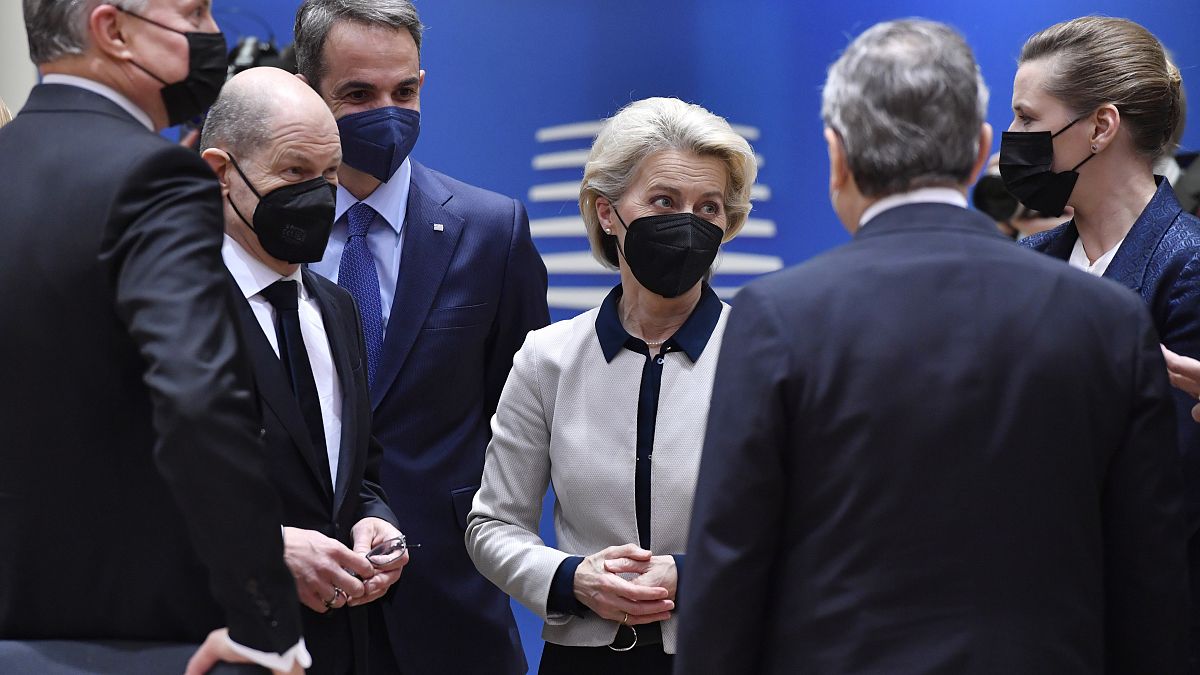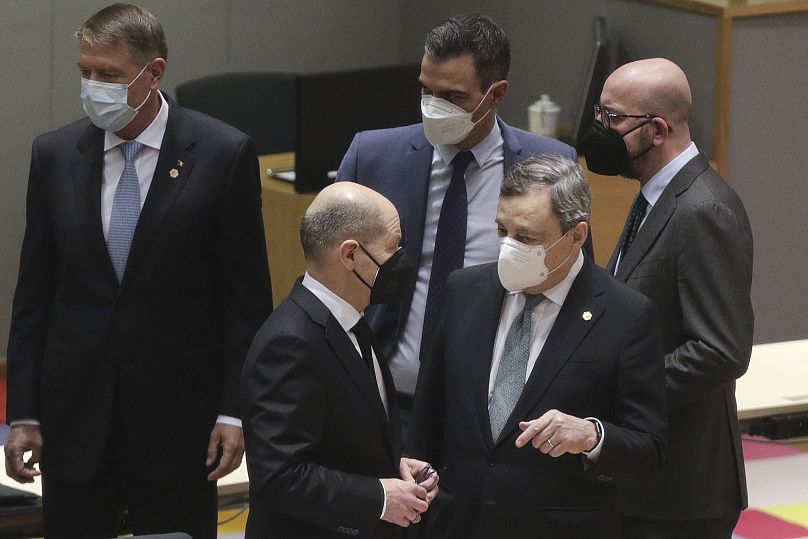Meeting in Brussels, EU leaders agreed on sanctions to hit several sectors at the heart of Russia's economy, with more details to be given on Friday.
EU leaders held an emergency summit in Brussels on Thursday in the wake of Russia's invasion of Ukraine and agreed on sanctions designed to impose "massive and severe consequences" on Moscow.
"These sanctions cover the financial sector, the energy and transport sectors, dual-use goods as well as export control and export financing, visa policy, additional listings of Russian individuals and new listing criteria," the conclusions say.
"Russia bears full responsibility for this act of aggression and all the destruction and loss of life it will cause. It will be held accountable for its actions."
The details will not become available until Friday at the earliest. The Council says it will "adopt without delay" the proposals prepared by the Commission and top diplomat.
It also recommends a further package of measures against Belarus.
EU leaders flew to Brussels with two main goals: to showcase the unity of the 27 member states and agree on a new, more radical package of sanctions against the Kremlin.
"We want to cut off Russia's industry from the technologies desperately needed today to build the future," European Commission President Ursula von der Leyen said.
Dutch Prime Minister Mark Rutte said: "It is about the leadership of Russia and being merciless in finances and the economy."
"This is not only against Ukraine, this is a war against Europe, against democracy," Lithuanian President Gitanas Nausėda told reporters. "They need our support today, tomorrow might be too late."
As expected, Russia's expulsion from the SWIFT payment system was not included among the measures, at least for the time being. Based in Belgium, SWIFT connects more than 11,000 financial institutions across the world.
President Vladimir Putin and Foreign Affairs Minister Sergei Lavrov were not expected to be personally targeted.
The European Commission has designed the package of sanctions in close cooperation with member states. Work began weeks ago when tensions at the Ukraine border intensified.
Put together, the measures are designed to severely limit Moscow's vital access to the EU's capital and financial services market, effectively blocking the refinancing of its national sovereign debt.
"We don't need sanctions that bark, we need sanctions that bite, and if the sanctions bite, they need to bite in a very thorough way," Belgian Prime Minister Alexander De Croo told reporters before the summit, adding he wanted to expand the current draft to hit Russia's elite and military-industrial complex.
But the damage will be far from unilateral.
The bloc is Russia's biggest trade partner, accounting for 37.3% of the country's total trade in goods in 2020. Given the many commercial ties with their neighbour, European countries will inevitably suffer from retaliation to a greater or lesser extent.
A key challenge for leaders is how to inflict the most immense pain on Russia while minimising the blowback for member states. Earlier on Thursday, reports emerged that Italy was particularly worried about the consequences for its profitable luxury industry.
Speaking under the condition of anonymity, EU officials said the issue of monetary compensation for countries whose economy is damaged was "too premature" to be analysed. Officials noted Germany and the Netherlands are estimated to be the countries most vulnerable to economic loss.
In addition to the Kremlin, the European Council also wants to punish Belarus, a country that has allowed Russian troops to enter Ukraine over their border. Action against Alexander Lukashenka's regime will be drawn up later, the Council said in its conclusions.
The country is already subject to a separate set of sanctions introduced as a result of the 2021 migration border crisis.
'Heavy toll on the Kremlin'
The ultimate intention of the emergency meeting was to put forward the harshest set of sanctions the bloc has ever imposed. Leaders called for an "immediate" ceasefire and the withdrawal of Russian troops.
"We will target strategic sectors of the Russian economy by blocking their access to technologies and markets that are key for Russia. We will weaken Russia's economic base and its capacity to modernise," said EU Commission President Ursula von der Leyen on Thursday morning, mere hours after the invasion commenced.
"We will freeze Russian assets in the European Union and stop the access of Russian banks to European financial markets."
The penalties are being deployed in coordination with the US, the UK, Canada, Japan, and Australia to display a united front, said von der Leyen.
"These sanctions are designed to take a heavy toll on the Kremlin's interests and their ability to finance war," she noted.
Since the European Council only gives political guidance, the work on sanctions will then fall onto national representatives to put the finishing touches and give the legal go-ahead. The measures enter into force after publication in the EU's Official Journal.
The second raft of sanctions comes on the heels of a package approved earlier this week that slapped travel bans and froze the assets of 27 individuals and entities close to President Putin, including his defence minister and his chief of staff as well as several commanders and "propagandists."
That initial draft also covered the 351 members of the State Duma who voted to recognise the self-proclaimed people's republics of Donetsk and Luhansk as independent.
Earlier this week, German Chancellor Olaf Scholz also announced his government had withdrawn an essential document needed for the certification of the Nord Stream 2, the controversial gas pipeline that links Germany and Russia.
Several of Scholz's fellow leaders, as well as US President Joe Biden, had demanded the project be blocked in response to Russia's aggression against Ukraine.
"Talking is cheap. Enough of cheap talking," said Polish Prime Minister Mateusz Morawiecki.
"We are buying, as the European Union, lots of Russian gas, lots of Russian oil. And President Putin is taking the money from us, from the Europeans, and he's turning it into aggression and invasion, he's destabilising the whole of Europe."
Ukraine: future EU country?
During the extraordinary summit, leaders underscored their support for Ukraine's sovereignty and independence and pledged to provide "additional political, financial, humanitarian and logistical support".
But some governments would like to take that support one step further – much further.
On the eve of the meeting, Poland and Slovenia suggested the EU should grant Ukraine the prospect of joining the bloc, something that will give the country's population "strategic hope as well as a motive to persevere in the defence of their homeland, sovereignty and democracy."
The appeal came from a joint letter signed by Morawiecki and Slovenian Prime Minister Janez Janša.
"Can the EU successfully respond to this historic challenge? It can and it should. The EU possesses the knowledge and experience to carry out a strategic solution: the well-developed instrument called enlargement. We need to draw up an ambitious and tangible plan for Ukraine's rapid integration into the EU by 2030," the leaders wrote.
"It is time for quick and courageous decisions. The struggle for Europe is ongoing. The historical lesson of the last two decades to be learned is that if the EU is not enlarging, somebody else is. Now we are paying a price for ignoring this. Let us learn from it, as the cost of ignorance will only increase in the future."
Membership of the EU -- as well as of NATO -- is a goal long pursued by Ukrainian officials, who often speak of a "European perspective". The idea is seen as far-fetched and has failed to gain traction in Brussels.
As of today, the only countries officially recognised by the EU as candidates are Albania, North Macedonia, Montenegro, Serbia and Turkey. In addition to this, Bosnia and Herzegovina and Kosovo have the status of potential candidates.

